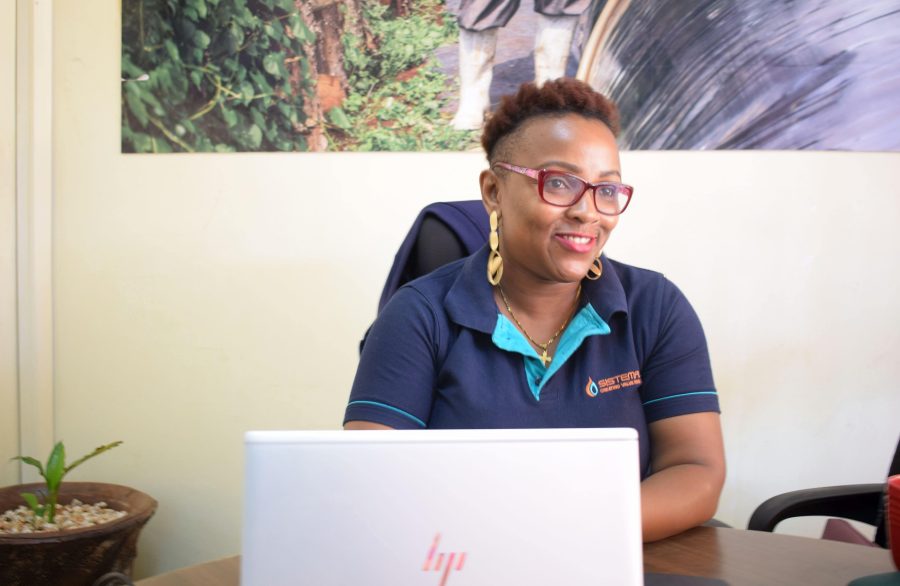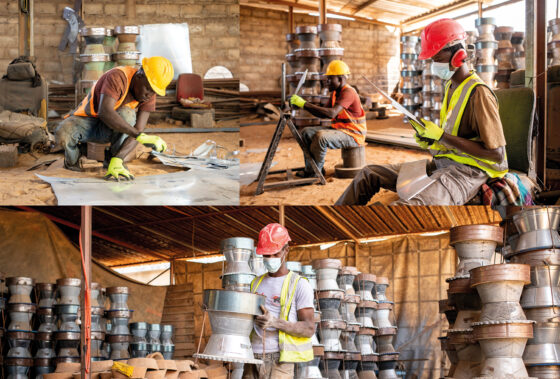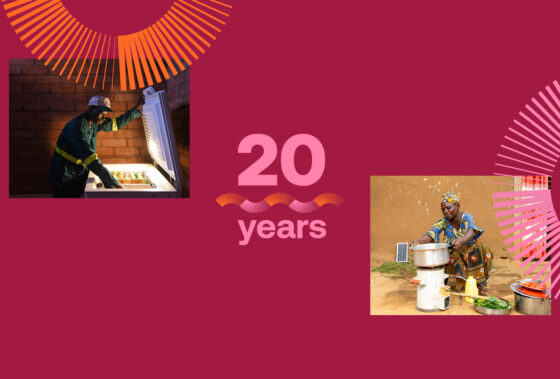Woman biogas entrepreneur forging change in Kenya

The biogas sector in Kenya is a male-dominated field: this is shown by an annual inventory of the biodigester enterprises in the country – conducted by the African Biodigester Component (ABC), one of EnDev’s associated projects. Out of the 41 interviewed enterprises, there are only five women owners against 34 men (two enterprises have one man and one woman each as CEOs). To celebrate the women who are forging change on International Women’s Day, the following interview with Eng. Madrin Maina sheds some light on her role as country director of Sistema Bio, the largest biogas company in Kenya.
What does International Women’s Day mean to you?
This is a special day to recognise and celebrate the contribution of women in society and to reflect on the journey so far. It also serves as an opportunity to raise awareness of issues specific to women that require attention and solutions. As a woman, I have come a long way, learning many lessons and gaining experience. Therefore, on this day, I take a moment to appreciate it all.
Can you give us a bit of background regarding Sistema Bio in Kenya?
Sistema Bio was established in 2010 and made its entrance into Kenya in 2017. We are currently present in 31 countries and have our headquarters in Mexico. We even recently passed the 8,000 installed units mark. Our team consists of 200 employees with 35% women. However, we are striving to increase this to 50%. Personally, I began my journey at Sistema Bio four years ago as I wanted to make a difference in rural homes.
When you began your career in the biogas industry, did you ever imagine that you would be a leader in a male-dominated profession? How is it actually like?
Imagination is free, so yes, I did imagine it. But it was certainly not an easy task. I had to put in an enormous amount of work and effort in upskilling myself, researching women in leadership and reaching out to them. Being a woman in a male-dominated profession calls you to seriously introspect on why you would want to become a leader and not the conventional roles that are assigned to you. You have to look for people to mentor you in that direction. Through LinkedIn, I was able to connect with women in spheres I could only dream of being in at the time. Some of these women became my mentors and introduced me into their circles. Their support was incredible and has greatly contributed to who I am today.
Nowadays, I can sit comfortably in a room full of men and address engineering and energy, and my voice will count as much as theirs. Persistence and getting out of your comfort zone are key.
As a female leader, what is the most significant challenge you encounter and how do you handle it?
There is a lot of pressure to become better than a man; a feeling that you always must overcompensate. However, once you deliver, people’s mindsets start changing, bringing up an aura of confidence without worrying that you will get watered down. The key was to accept that fear is normal, but to always believe in myself and what I can bring to the table.
What is the one thing you now know about women and work that you wish you had known earlier in your career?
There is a notion of women in the homes that lauds them for being wonderful home managers, great with people and excellent budgeters. I tell you that this is also true of women in the workplaces. Here at Sistema Bio, the top 10 best sellers are all women.
What would you tell women who are just starting to work or want to start their business?
For young women who are just beginning: be clear on what you want, believe in yourself, cast all doubts aside and take that first step. I especially urge students to look for internships at least two years before graduation.
For women already in workplaces and businesses: do not hold yourself back from doing difficult tasks, be reliable in everything you do and you will stand out, then excel at it. Remember, tough times do not last, it is the tough people that do. Often women are left behind in tough duties that are believed to be masculine duties. Getting out of our comfort zones, however, allows us to gain a whole world of exposure and build our skillsets.
Finally, I encourage networking. Find opportunities and platforms to speak to other people out there, find a mentor to guide you in your growth and career paths. It has worked out for me, there is no reason it would not work out for you either. As my way of giving back, I have mentored and continue to do so in my former high school and as Advisory Board Member in a few girls’ schools and community organizations. In 2023, I am looking to get involved in more advisory roles at spheres creating impact on climate change and gender equality.
Download
About the African Biodigester Component
Funded by the Dutch Ministry of Foreign Affairs (DGIS), the Danish International Development Agency (DANIDA), the European Union (EU) and coordinated by the Netherlands Enterprise Agency (RVO), the African Biodigester Component (ABC) aims at facilitating a shift of the biodigester market from its pioneering to the expansion. The component is implemented by a consortium between GIZ and SNV in cooperation with the Africa Bioenergy Partnership Limited (formerly called Kenya Biogas Programme).
For more information and resources on EnDev’s gender activities, please visit EnDev’s Gender Page.

